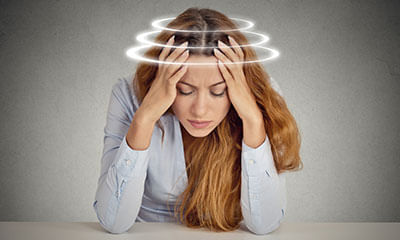VERTIGO - Causes, Symptoms, Types and Homeopathic Treatment
What is Vertigo and what causes it?
Vertigo is a sensation or feeling of spinning around and losing one’s balance even though there is no movement in you or environment.
What Causes Vertigo?
If the vertigo is caused by problems in the brain or central nervous system it is referred to as central vertigo and if vertigo is caused by problems in inner ear, then it is termed as a peripheral vertigo.
The labyrinth of the inner ear has tiny organs that allow messages to be sent to the brain in response to gravity. By intimating our brains about the movement from the vertical position, we are able to maintain balance or equilibrium. Disturbance to this system, therefore, produces vertigo that can be created by inflammation among other causes.

Inflammation can be observed in the following conditions
- Labyrinthitis: This is inflammation of labyrinth and vestibular nerve (the nerve that is responsible for encoding the body’s motion and position)
- Vestibular neuronitis: This is due to inflammation of the vestibular nerve.
- Meniere’s disease: It is a disorder of the inner ear that is characterized by episodes of vertigo, ringing in the ears (tinnitus), hearing loss, and fullness in the ear. The cause of Meniere’s disease is unclear but likely involves both genetic and environmental factors. A number of theories exist for why it occurs including constrictions in blood vessels, viral infections, and autoimmune reactions.
- Cervical Spondylosis Patients having slight degeneration of the cervical spine and the presence of osteophytes also have a tendency to develop Vertigo.
Benign paroxysmal positional vertigo(BPPV)
(BPPV) is the thought to be caused by a disturbance in the otolith particles. Otolith particles are the crystals of calcium carbonate present in the inner ear fluid that pull on sensory hair cells during movement and so stimulates the vestibular nerve to send positional information to the brain. In people with BPPV, endolymph fluid continues to move even after the normal head movement has stopped.
BPPV vertigo can also be caused by
- A head injury
- Reduced blood flow in a certain area of the brain
- An episode of labyrinthitis
- Ear surgery
- Prolonged bed rest.
Central Vertigo
Central vertigo occurs by following causes -
- When there is a disturbance to the part of the brain (brainstem and cerebellum) that deals with interaction between the senses of vision and balance and
- Sensory messages to and from the thalamus.
- Migraine headache
- Transient ischemic attack (TIA)
- Multiple sclerosis: The inability to move the eyes to the midline toward the nose.
- Acoustic neuroma: Vertigo causing one-sided ringing in the ear and hearing loss.
Symptoms of Vertigo
Vertigo is normally caused by a change in the position of the head. The following symptoms may be experienced by the people, who are suffering from Vertigo
- Spinning
- Vomiting
- Feeling nauseated
- Unbalanced
- Pulled to one direction
- Ringing in the ears or hearing loss
- Abnormal or jerking eye movements (nystagmus)
- Sweating
- Headache
Treatment for vertigo
- Treatment for vertigo depends upon the type and severity of the problem. Avoiding consumption of substances that can affect circulation, including caffeine, tobacco, or alcohol, drinking plenty of fluids.
- Consumption of lavender and vitamin-D rich food.
- Physiotherapy exercises include head and body movements done while sitting on bed (It is better to take guidance of physiotherapists for better and fast relief.)
- Medications or treatment can be taken only after doctor’s consultation. Homeopathic treatment is fast and the relief will be long-lasting. In most of the cases, homeopathic medicines cured the disease without surgeries and side effects when conventional medical system suggested surgery.
Common remedies for Vertigo
- . CONIUM MACULATUM: Conium is an excellent remedy for the treatment of vertigo with difficult gait, trembling, sudden loss of strength while walking. People complain about vertigo when lying down and turning over in bed. Slight noise or conversation of others or even shaking the head slightly produces vertigo.
- COCCULUS INDICUS: Vertigo accompanied by nausea during traveling can be very effectively treated with this Homeopathic medicine. Cocculus gives very good results when the Vertigo is accompanied by nausea.
- BELLADONNA:Severe throbbing of the head associated with vertigo. The patient feels that he is falling to the left side or backward. It is also effective in patients with Cervical Spondylosis.
- CALCAREA FLUORICA: The best remedy for the treatment of Vertigo due to Cervical Spondylosis where bony tissue is involved.
Update From Lybrate: Brain care supplements are beneficial for the healthy working of the brain. Buy these Brain Care supplements from Lybrate and enhance your creativity, skills, memory, etc.



+1.svg)
